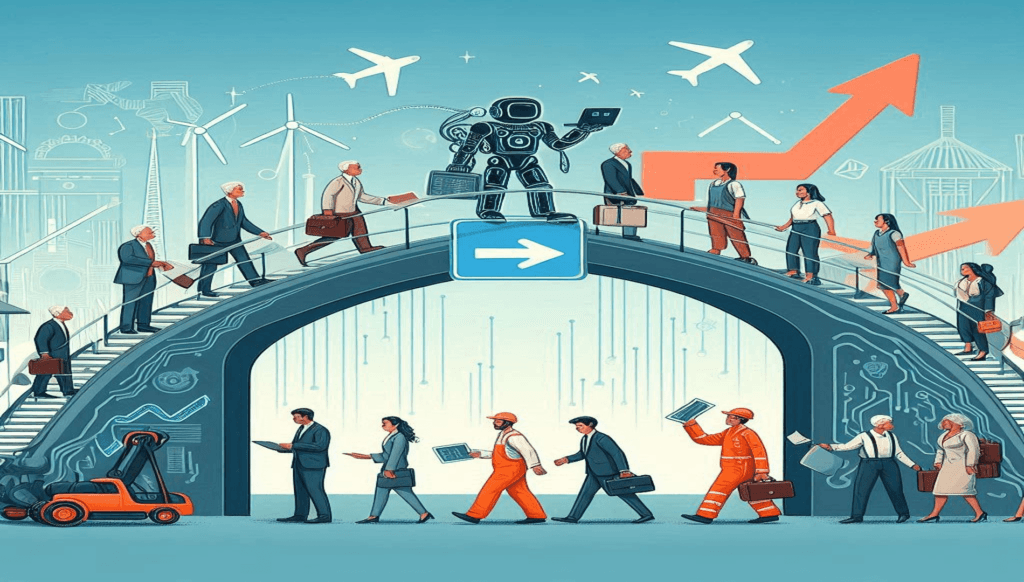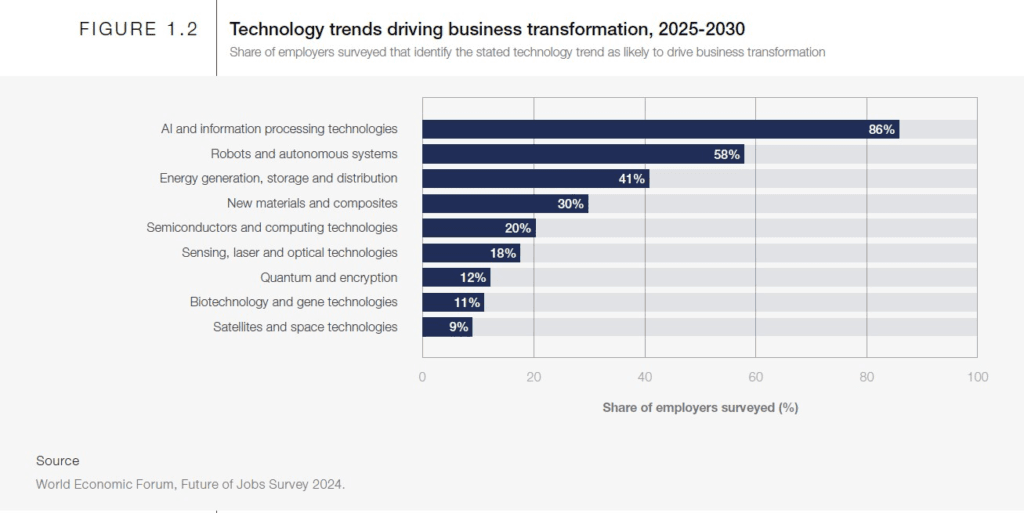
The world of work is not static; it is a dynamic and ever-evolving landscape, shaped by powerful forces that ripple across industries and geographies. As we stand at the cusp of 2025, it’s clear that the global labour market is undergoing significant transformations driven by several key macrotrends. These trends, ranging from rapid technological advancements to pressing environmental concerns and geopolitical shifts, are not just abstract concepts; they are tangible forces that will directly impact the jobs we do, the skills we need, and the fabric of our working lives. To navigate this new world of work successfully, we must understand these macrotrends and how they will shape the future job market by 2030.
The Five Macrotrends: A Convergence of Forces
The World Economic Forum’s Future of Jobs Report 2025 identifies five macrotrends expected to impact the labour market in the coming years profoundly. These interconnected forces are:
- Technological Change: Rapid advancements in areas like artificial intelligence (AI), automation, and digital access are fundamentally altering how work is done.
- The Green Transition: The global shift towards sustainable practices and renewable energy is creating new jobs while transforming existing industries.
- Geoeconomic Fragmentation: Increasing geopolitical tensions and trade restrictions are disrupting global supply chains and impacting labour markets.
- Economic Uncertainty: Volatility in economic conditions, including inflation and slower growth, is creating both challenges and opportunities for workers and businesses.
- Demographic Shifts: Changes in population demographics, such as ageing workforces and shifts in working-age populations, are impacting labour supply and demand.
These macrotrends are not isolated incidents but rather a convergence of forces that together create a complex and evolving picture of the future of work.
Technological Change: The Digital Transformation
Technological change is undoubtedly the most transformative of these macrotrends, expected to impact a staggering 60% of businesses by 2030. The rise of AI, particularly generative AI (GenAI), is reshaping industries and tasks across all sectors. In my opinion, this is not just about replacing human workers but augmenting their capabilities. For instance, GenAI could empower less specialized employees to perform more complex tasks, while equipping skilled professionals with the latest knowledge.
- Broadening Digital Access: This is expected to be the most transformative trend, with 60% of employers expecting it to transform their business by 2030. The expansion of digital access is also a major factor driving the increased demand for technology skills.
- AI and Information Processing: Advancements in AI and information processing are expected to be highly transformative (86%). This trend is also fueling demand for technology-related skills such as AI and big data, networks and cybersecurity, and technological literacy.
- Automation and Robotics: Robotics and automation are expected to transform 58% of businesses, and are also driving demand for tech skills. Furthermore, automation is contributing to the decline of roles that require manual dexterity and precision.
The Green Transition: A Greener Future of Work
The green transition, driven by the need to address climate change, is another significant macrotrend. It is not only about environmental stewardship but also about creating new opportunities in the labour market. As companies invest in green technologies, new roles requiring specialized skills will emerge. For example, the Energy Technology and Utilities sector is anticipating a need for Environmental Engineers, AI and Machine Learning Specialists, and Renewable Energy Engineers.
- Environmental Stewardship: This skill is gaining importance across various industries, with some sectors, such as Mining and Metals and Government and Public Sector, placing a greater emphasis on it than others.
- Green Skills: As industries shift towards sustainable practices, there’s an increasing demand for individuals with green skills, with the LinkedIn platform showing an outperformance in hiring rates for individuals with green skills.
- Industry Transformation: Sectors like Energy Technology and Utilities are expected to undergo significant transformation due to investments in greener technologies.
Geoeconomic Fragmentation: Navigating a Divided World
Geoeconomic fragmentation, characterized by increasing geopolitical tensions and trade restrictions, is also impacting the labour market. Therefore, this trend is disrupting global supply chains and forcing companies to rethink their strategies.
- Geopolitical Divisions: 52% of employers in Germany expect impacts from growing geopolitical divisions, above the global average of 34%.
- Trade Restrictions: The Automotive and Aerospace sector is particularly concerned about the impact of rising geopolitical tensions and increasing trade restrictions. As such, companies are now considering reshoring, nearshoring, or friendshoring to mitigate the effects of global disruptions.
- Regional Impacts: Central and Southern Asia, particularly India, is expected to be impacted by geopolitical tensions.
Economic Uncertainty: Navigating Volatile Conditions
Economic uncertainty, marked by inflation and slower growth, is creating a mixed outlook for job creation. While global inflation is expected to ease, the cost of living remains elevated, and this affects the job market in several ways.
- Cost of Living: Half of employers expect the increasing cost of living to transform their business by 2030 [14]. This has an impact on job creation, increasing the demand for creative thinking, resilience, and agility.
- Slower Growth: A general economic slowdown is anticipated to transform 42% of businesses . This is expected to displace 1.6 million jobs globally.
- Job Growth: Despite the negative impact of slower economic growth, this trend is also projected to be a top driver for growth in roles such as Business Development Professionals and Sales Representatives.
Demographic Shifts: Adapting to Population Changes
Demographic shifts, which include aging workforces and growing populations in different regions, are also impacting the labour market, creating both opportunities and challenges. Indeed, these shifts have a profound effect on the availability of talent.
- Aging Workforces: Companies in Eastern Asia expect aging and declining working-age populations to transform the region’s labour markets.
- Growing Populations: Conversely, some regions are experiencing growing working-age populations . This creates a need for businesses to tap into diverse talent pools.
- Talent Availability: About 50% of employers in Sweden identify aging and shrinking workforces as a key trend, while 41% highlight growing working-age populations elsewhere.
The Interplay of Macrotrends on Skill Disruption
These macrotrends do not operate in isolation; they interact with each other to create complex challenges and opportunities in the labour market. For example, technological change is not just about automation; it also requires individuals to develop new skills to work alongside AI-powered systems. Furthermore, the green transition is not just about environmental regulations; it’s about creating new jobs that require both technical expertise and environmental awareness.
The intersection of these macrotrends also highlights the importance of continuous learning. Skills like analytical thinking, resilience, flexibility, agility, and lifelong learning are not just desirable; they are essential for navigating the ever-changing landscape of work.
Navigating the Future: A Call to Action
Given these macrotrends, what can individuals and organizations do to adapt and thrive?
For Individuals:
- Embrace Continuous Learning: Develop a mindset of lifelong learning and actively seek opportunities to acquire new skills.
- Focus on Core Skills: Invest in developing core skills such as analytical thinking, resilience, and creativity.
- Develop Tech Skills: Focus on acquiring skills related to AI, big data, cybersecurity, and digital literacy.
- Consider Green Skills: Develop an understanding of sustainability and environmental stewardship].
- Be Adaptable: Be prepared to pivot to new roles and industries as the labour market changes.
For Organizations:
- Invest in Reskilling and Upskilling: Prioritize training programs to ensure workers have the skills needed for future roles.
- Focus on DEI: Broaden hiring practices and tap into diverse talent pools.
- Embrace Technology: Adopt technologies that augment human capabilities and streamline processes.
- Adapt Workforce Strategies: Implement flexible work arrangements and support employee well-being.
- Address Transformation Barriers: Tackle issues such as organizational culture and skills gaps that hinder business transformation.
Here’s What I Think:
The convergence of these powerful macrotrends presents a complex but ultimately optimistic outlook for the future of work. In my view, while some jobs will decline and new skills will be needed, the overall employment outlook is positive. However, success depends on the ability of individuals and organizations to proactively adapt to these changes. This requires a commitment to lifelong learning, a focus on core and emerging skills, and a willingness to embrace new technologies. By understanding these macrotrends, we can navigate the shifting sands of the labour market and create a more resilient and prosperous future of work for everyone.
Sources of Insights
- World Economic Forum. (2025). The Future of Jobs Report 2025.

Ajay Dhage is a seasoned talent acquisition leader with over 20 years of experience in Talent Acquisition and Workforce Strategy across the oil and gas, EPC, and renewables sectors. As Talent Acquisition Lead for a global Oil & Gas EPC company in India, he manages the end-to-end hiring lifecycle for complex, multi-disciplinary projects, from sourcing and assessment to onboarding and workforce planning. Known for his customer-focused approach and innovative use of AI and data in hiring, Ajay focuses on building future-ready workforces and resilient leadership pipelines. Through ajayable.com, he shares insights, trends, and practical frameworks to help HR professionals, organisations, and recruiters excel in a rapidly evolving, competitive talent landscape.











